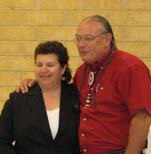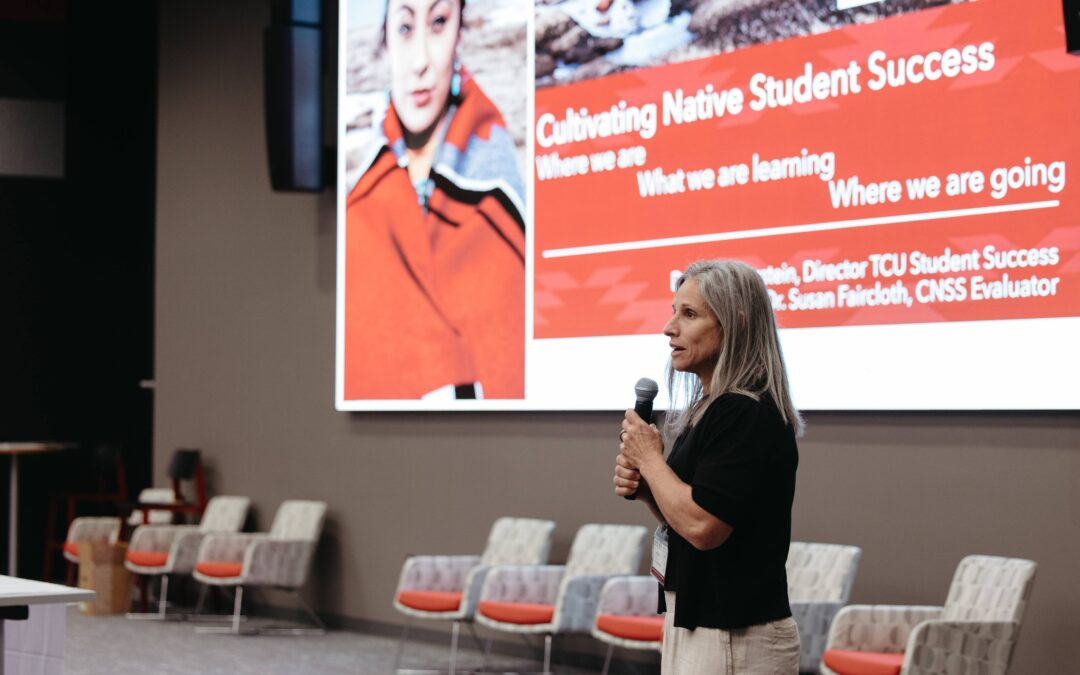
Dr. Laurel Vermillion, President of Sitting Bull College, poses with Richard B. Williams of the Fund
Did you know that 16 of our 33 accredited tribal college presidents are women? These warriors are on the front lines in Indian Country, helping to provide hope, guidance, and inspiration to our young people in their fight against poverty and they honor us every day with their sacred work.
We’d like to introduce you to one of our women presidents, Dr. Laurel Vermillion (Hunkpapa Lakota), of Sitting Bull College (SBC), located on the Standing Rock Indian Reservation that straddles North and South Dakota. Dr. Vermillion grew up on the reservation and has lived there her entire life.
Dr. Vermillion first became interested in tribal colleges as a student at SBC in 1973 (which was then known as Standing Rock College). Vermillion remembers, “We didn’t have a school or classrooms then, we just had the idea.” She and several other students would meet Dr. Jack Bardon in a building in Ft. Yates and “he would take us to a corner or a hallway or somewhere to sit and we would have class,” she said.
Dr. Vermillion went on to earn a doctorate degree and was named the President of SBC in 2006. She quotes Sitting Bull as her guiding force, who said, “Let us put our minds together to see what we can build for our children.” Today SBC occupies its own campus and has a satellite campus and boasts a state-of-the-art science and technology center.
Dr. Vermillion has seen the impact that scholarships make on students. The average family on the Standing Rock Reservation earns little more than $3,000 a year from dry land farming and unemployment can be as high as 65%. She says when students choose not to go to college it is often because they lack financial resources. “Our students can go anywhere they want to. We are getting the top students in their high schools, but they are choosing our tribal colleges,” she said. Dr. Vermillion noted that when Native students “choose our tribal college they are choosing to build their own self confidence and self-esteem by learning about their culture and their traditions… many of our students come from homes where people assimilated or they went on to boarding schools and didn’t spend a lot of time at home, so they don’t know those stories and they don’t know about their culture.”
Dr. Vermillion said she knows this herself. The tribal college “is where I learned about my language, traditions, and culture. I didn’t go to boarding school, but I was brought up Catholic. That [religion] was all I knew growing up. Both of my parents were very fluent in Lakota but they never spoke it at home. My grandparents spoke Lakota to each other and practiced Lakota traditions (drying meat and corn and beadwork) but I didn’t know traditions, sweats, and ceremonies. I didn’t learn about those things until I started taking classes at Sitting Bull College. That’s what I want to stress: our students will learn who they are when they come to a tribal college. When people know their culture, language, and traditions and are proud of it, those students will do better at everything for themselves—at college, in a career, and more. We teach people to live in both worlds because they have to, and they will be successful.”
Thank you Dr. Vermillion and all of our Native women leaders and students. Happy International Women’s Day!









